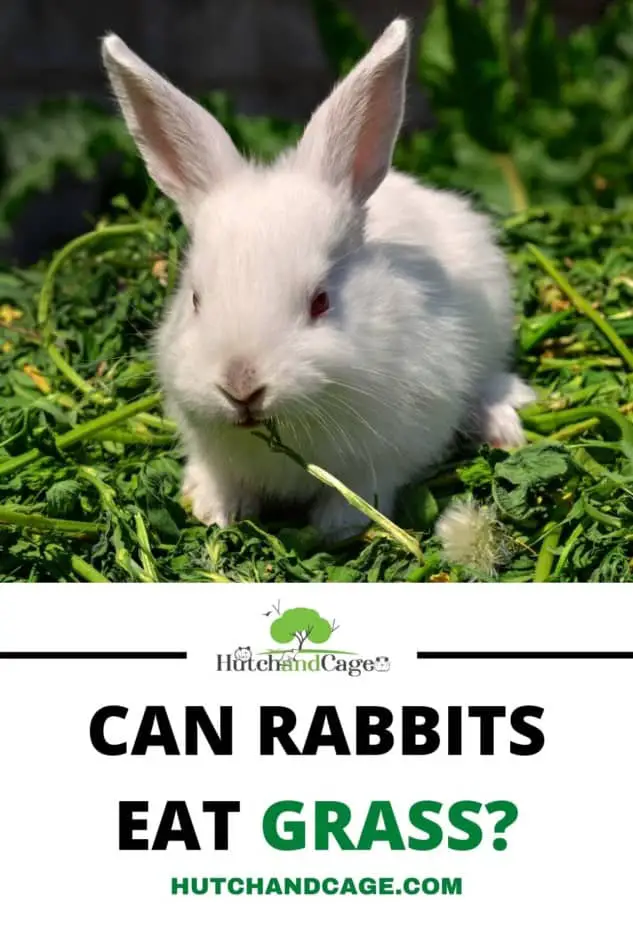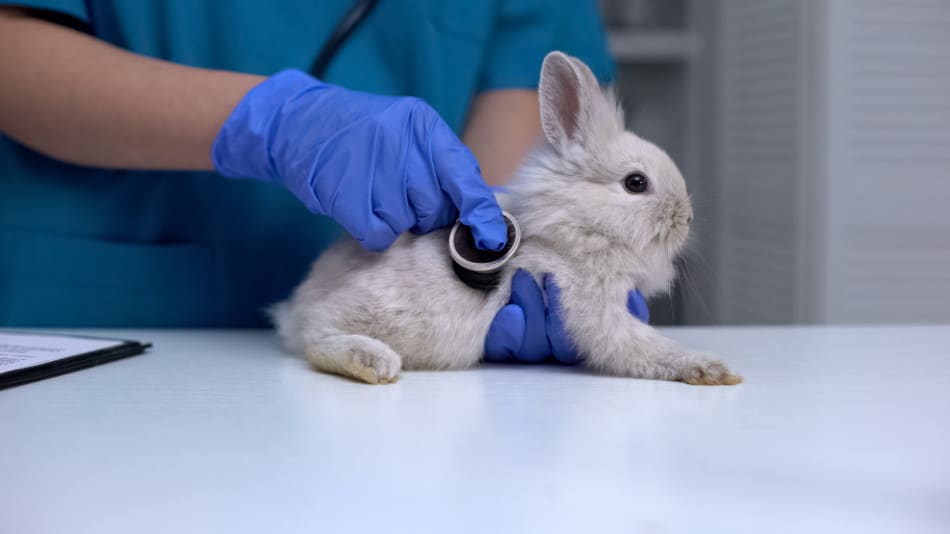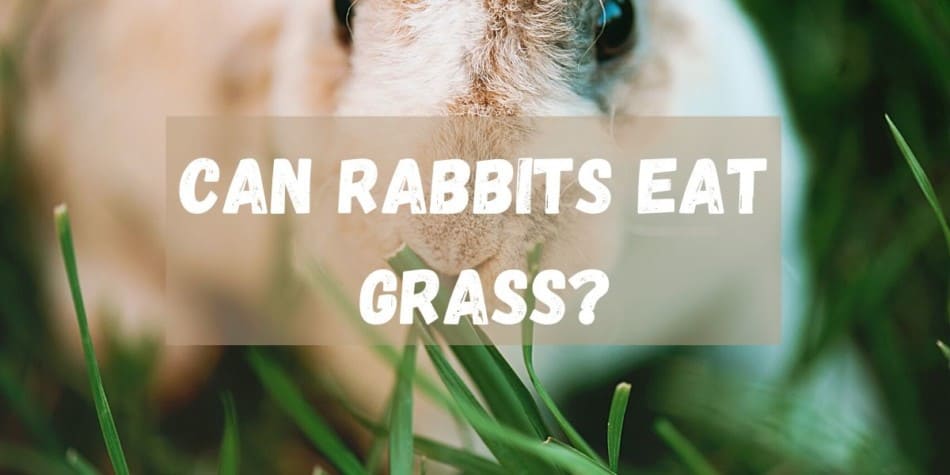The issue of feeding pets arises when one has acquired them. Rabbits are no exception. These exclusively herbivorous mammals require regular feeding. Therefore, the choice of feeds should be taken care of in advance. To many bleeders, the main question has always been: Can Rabbits Eat Grass?
The straight forward answer is YES. Not all grasses are useful, and some can simply lead to the death of animals. Therefore, breeders should be well acquainted with what kind of greenery is permissible, and which should not be fed to their pets.
Table of Contents
Why grass is good for rabbits
Grass is a fibre-rich fee. It has a beneficial effect on the digestive system, due to which a large number of bezoars from wool does not accumulate in the body. Besides, grass helps rabbits grind their teeth and has several other useful properties.
It is recommended to give rabbits grass in a dry state. And, since everything is good in moderation, you should not overfeed rabbits even with the most useful grass.

Useful properties of grass
A variety of grass contains proteins, fibre, carbohydrates (fructose and glucose), flavonoids (camferol and quercetin), essential oils, and vitamins (A, B, C, E, K, PP). Also, it contains large quantities of minerals such as potassium, magnesium, sodium, calcium, phosphorus, chlorine, copper, iron, zinc, and selenium.
Especially useful and nutritious are young shoots of grass before flowering. Some grass seeds contain fats and oils. Some grass has anthelmintic, anti-inflammatory, and hemostatic properties, which help in normalizing digestion. It should, however, be given in small quantities mixed with other herbs.
Advantages of feeding rabbits with grass:
- Minimal costs incurred during collection and harvesting.
- The use of grass reduces the consumption of more expensive grain, animal feed.
- Plant amino acids and proteins accelerate growth and increase the weight of animals.
In what form can rabbits be given grass?
Rabbits should not be given fresh grass for food. Be sure to remember that greens should not be mowed near a road or factory, where a lot of dust and toxic waste products get on the plant.
Usually, when the grass is harvested in excess, the unused portion can be left to dry as hay. When preparing grass, it is worth carefully checking so that poisonous plants do not get into the food.
Before feeding your rabbit, consider the following guidelines
Rabbit feeding should be designed in such a way that it must constantly chew. Therefore, hay and branches must be in the feeder constantly. It is proved that when using a mow cutter, plants are oxidized from metal nozzle blades. Therefore, grass for rabbits, torn by hand, is considered more useful and safe.
Among the main recommendations for grass, feeding is; any plant material should be washed from dust and dried in a dry place; drying time should be between 3-4 hours; Dry in a thin layer on a clean surface and periodically turn over.
When choosing grass, use simple rules: if you don’t know the plant, do not give it to your pet. There are so many useful and neutral plants that you are sure to choose a quality diet for your pet.
Here are the different forms of grass that you need to know before feeding your rabbit.
Wet grass
Wet grass refers to grass collected immediately after rain, or with dew is strictly forbidden to feed rabbits. Such grass decays very quickly and can cause disorders on rabbits with a delicate digestive tract.
Moisture promotes the fermentation process, and the stomach may swell in some rabbits. In a humid environment, pathogenic microorganisms multiply faster. After such feeds, rabbits may develop intestinal infections.
Rough grass
Rough grass is not contraindicated for rabbits, but their use is impractical. Rabbits are very reluctant to chew. Besides, in such a feed there are few useful substances. The basic composition of coarse grass is the fibre that is difficult to digest for animals.
Grass with flowers and seeds
It is advisable to collect all the grass before flowering. Grass that bloom should be treated with caution. Species, such as colza, have poisonous seeds. At all stages of development, only dandelions and legumes are harvested.
Sowing grass to feed rabbits
To ensure that rabbits are fed green feeds, breeders need to not only rely on wild vegetation or a vegetable garden but also highlight the area where the grass feed is sown. The best option is to plant cereals (oats, wheat), legumes (peas, vetch, clover, alfalfa).
Self-sowing will always help the rabbit breeder during a drought, or in the absence of a temporary ability to harvest other types of grass.
Growing grass on your plot for harvesting during winter is very practical and economical.
How to feed greens?
In early spring, when rabbits begin to switch to summer feeds, grass may begin to be added gradually. During this time, feeding is done at a rate of 50 grams of grass per rabbit. Also, other types of feeds are added to it.
The rate of grass for rabbits is increased every day, and after two weeks an adult male rabbit may receive up to one and a half kilograms, females rabbits up to a kilogram, and young rabbit 600 grams of grass per day. This is more than half the daily intake of all feeds.
You need to know that hay should always be present in the feeders. It can be replaced by young shoots of trees. A coarse feed is needed to grind growing incisors. Feeding grass with mould or rot is not allowed.

Grass requirement
With green feeding, it will be right to give the rabbits grass that has lost tuber in the sun. In this case, the grass for rabbits should be clean, washed if necessary. Such grass has already lost part of its moisture and has a beneficial effect on digestion.
The mass used for green food should be prepared only from young grass. After flowering, all plants coarse. Therefore, bleeders should harvest the grass during the second half of summer, when the plants are already blooming or ripening. Plants such as phacelia, mustard, vetch will quickly give a young green mass.
What kind of grass should not be given to rabbits?
There are some types of herbs that cause diarrhoea in rabbits, bloating, and cramps. However, before proceeding to the consideration of poisonous species of herbs that are not recommended for feeding to rabbits, this is what should be said.
Rabbits should never be given mouldy or rotten grass. Also, do not mow the grass for these animals near busy roads. Exhaust fumes and dust contained on the road grass will not have a beneficial effect on the rabbit’s body. Poisonous grass herbs for rabbits are:
- Spurge
- Datura
- Hemlock
- Swamp Wingfly
- Cornflower
- Buttercups
- Celandine
- Cockle, and some other herbs
As a rule, all poisonous herbs grow most often in shaded and damp places. After drying, most often, they lose their harmful properties.
Therefore, if you are not sure about the harmlessness of a particular grass for a rabbit, collect vegetation only in proven places. Moreover, the more diverse the grass diet for feeding rabbits is, the more intense their growth will occur.
You should never feed rabbits grass you are not sure of its effects, as this will negatively affect the immunity and appetite of animals.
The right proportion of grass to feed an adult rabbit
The proportion of green feed should be no more than 30% of the total diet – this is one of the rules of feeding. Excess feeding of grass causes diarrhoea due to the abundance of plant proteins. In a large volume, proteins are not absorbed by the body.
Clarifying how to feed an adult rabbit, it should be noted that the average diet consists of: hay – 10-11%; root crops – 9-10%; greens – 40%; concentrates – 35-40%. You need to feed animals three times a day.
Branches and hay must be accessible at all times, and green feed and concentrates not eaten by the pet must be removed so as not to create an environment for the development of various pathogens, fungi, and mould.
Preparing grass before feeding rabbits
Having decided on the question of what kind of grass rabbits eat, you need to understand how to prepare it for feeding. The grass does not require any specific preparation for feeding the rabbit, however, it must be washed off the ground, and shake off the water before laying it in the feeders.
When using beet tops, it is necessary to sprinkle it with ground chalk a little, as it has a laxative effect. Of course, the grass must be fresh! You can’t use rotted grass, but if this still happened, you need to use wormwood, oak, or chamomile – as they have an astringent effect.
Common mistakes when feeding fresh grass to rabbits
- Feeding grass in large quantities can lead to the poisoning of the rabbit. Grass contains oxalic acid. Although oxalic acid may be beneficial in small amounts, it is dangerous in large quantities.
- Feeding large quantities of grass containing sugar cause fermentation in the intestines and bloating.
- Long-term storage in a pile of mowed grass leads to fermentation which is dangerous for rabbits.
First aid for rabbit poisoning resulting from grass consumption
When giving fresh rabbit grass, avoid getting unknown plants into it. Given that this cannot always be avoided, it is better to feed small portions at first.
If we are talking about one pet, it is better not to give him a narcotic wild-growing grass. Even a completely harmless fodder grass could grow on soil saturated with toxic substances.
Grass cut under shade is best given in the form of hay. The most effective help for poisoning can be provided if it is known which poison the rabbit ate.
In most cases, especially when it comes to a bunch of grass, it is not possible to establish the type of poison. If the rabbit is poisoned and the source is not known, it needs to be given first aid before the arrival of the veterinarian.
Always seek medical advise from a Vet before giving any treatment to your rabbit!
You can use laxatives to facilitate the well-being of the rabbit, as the stomach is cleaned as much as possible.You can also use drugs that can be given for poisoning with unknown poison:
- Activated carbon-50 g per 1 litre of water
- Carlsbad salt-3 – 6 g per head
- Calomel 0.02-0.03 g per 1 kg of rabbit weight
- Calomel is mercuric chloride. In veterinary medicine, they are used as a choleretic and laxative.
- Carlsbad salt: product of evaporation of water from Carlsbad springs. Carlsbad salt and calomel are not given at the same time. Give one of these drugs together or immediately after giving activated carbon. In rabbits, there is no gag reflex, so trying to give him gag drugs will worsen the matter.
In absence of the above drugs, use natural antidotes. One of the well-known is milk. Give it to rabbits 40-50 ml at a time 3-4 times a day. The rabbit itself is unlikely to drink it in such quantities, so you have to pour it by force from a syringe.

The rabbit is given the medicine in liquid form using a syringe with a needle removed. For diarrhoea, make sure the rabbit’s body is not dehydrated.
To prevent dehydration in the field, you can either forcefully solder the water (this also helps the kidneys cleanse the body of the poison), or by subcutaneous injection of sterile saline.
With obvious signs of irritation with stomach poison (pain symptoms, salivation), the rabbit is given proteins and mucous membranes:
- milk;
- Chicken protein ;
- liquid paste;
- a decoction of flax seeds;
- rice broth;
These are universal and fairly affordable antidotes, suitable not only for use in grass poisoning but in severe other cases of poisoning. It is, however, necessary to use medications, which can only be prescribed by a veterinarian.
Conclusion: Can rabbits eat grass?
When treating your rabbit with greens, you need to know exactly which grass will benefit it and which can harm. In no case can rabbits be fed with poisonous grass.
If the rabbit is not accustomed to eating fresh grass, don’t let it out to graze on the grass. The digestive system of such an animal will not be able to cope with succulent food, and the walk will end with bloating and diarrhea.
5 Brands of Hay we love!










